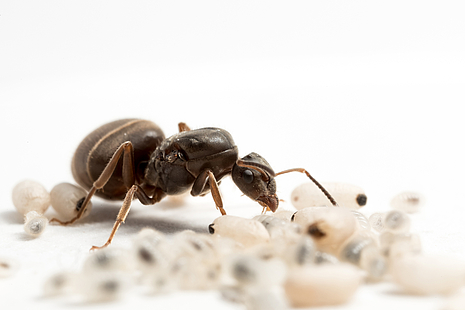Libbrecht/Colgan/Ketting
Role of gene regulation in the social control of queen behavior in ants
Supervisor: Romain Libbrecht
Co-Supervisor: Joe Colgan, René Ketting
Scientific Background:
Division of labor between specialized castes is central to the functioning and evolution of insect societies. Queens monopolize reproduction, while workers perform all the tasks necessary to maintain the colony, including brood care. Queens are typically seen as egg production units, to the point where their function in insect societies has been compared to that of the germline in multicellular organisms. However, queens that found a new colony independently are pluripotent, as they both reproduce and nurse the brood to produce their first cohort of workers. Interestingly, the transition from pluripotent founding queens to specialized established queens recapitulates the evolutionary transition to eusociality from subsocial ancestors. Therefore, investigating the behavioral specialization of social insect queens would help to better understand the development, functioning and evolution of insect societies. Yet very little is known about the factors and mechanisms that drive the queen behavioral transition.
Recent findings from my research group have revealed unexpected flexibility in the brood care behavior of queens of the black garden ant Lasius niger. We have developed protocols to experimentally manipulate the presence of workers, and precisely measure the behavioral response of same-age queens. We found that the presence of workers is necessary and sufficient to inhibit their brood care behavior. In addition, we showed that removing workers from established colonies resulted in old queens to revert to expressing brood care. These results indicate that the presence of workers not only initiates, but also maintains the behavioral specialization of queens. We have used brain RNAseq to identify genes that differ in expression between queens with and without workers, as well as between queens that differ in their levels of brood care behavior.
PhD project: Role of gene regulation in the social control of queen behavior in ants
In this project, we propose to ask the question: What are the gene regulatory mechanisms that regulate the gene expression changes underlying the social control of queen nursing behavior? To address this question, we will build on preliminary results that identified candidate regulators of gene expression.
Our RNAseq analyses revealed that an interesting candidate gene, coding for a transcriptional repressor, is overexpressed in presence of workers, when queens do less brood care. To further characterize the role of this gene in the social control of queen nursing behavior, we propose to i) use RNAi to functionally validate its role by producing queens that do not respond to the presence of workers, ii) use RNAseq to investigate how RNAi downregulation affects downstream patterns of gene expression, and iii) use mRNA FISH to detect and localize the expression of the candidate gene in the brain, and thus define its spatiotemporal expression patterns.
Preliminary experiments revealed that the presence of workers did not affect the nursing behavior of queens when they were treated with chemical inhibitors of p300/CBP histone acetyltransferases and DNA methyltransferase. These results suggest that epigenetic processes such as histone acetylation and DNA methylation may regulate the social control of queen nursing behavior. To investigate this possible role, we will use different sequencing technologies to assess epigenetic changes in response to manipulations of the social environment, and identify the genomic location of epigenetic marks, as well as their associations with behavioral variation and gene expression changes. We plan to use ChIPseq and/or CUT&RUNseq to study histone modifications, WGBS to investigate DNA methylation, as well as ATACseq for more global analyses of chromatin accessibility.
The GenEvo network will support this project via co-PIs Joe Colgan (social insects, bioinformatics) and René Ketting (mRNA FISH, ATACseq), as well as possible collaborations with Susanne Foitzik (social insects, ChIPseq), Peter Baumann (ChIPseq), and Joan Barau (CUT&RUNseq).
Publications relevant to this project
1. Psalti M, Gohlke D, Libbrecht R (2021) Experimental increase of worker diversity benefits brood production in ants. BMC Ecology and Evolution 21:163
2. Teggers E, Deegener F, Libbrecht R (2021) Fecundity determines the outcome of founding queen associations in ants. Scientific Reports 11: 2986
3.Libbrecht R, Nadrau D & Foitzik S (2020) A role of histone acetylation in the regulation of circadian rhythm in ants. iScience 23: 100846 – On the cover of the March 2020 issue
4. Kohlmeier P, Alleman AR, Libbrecht R, Foitzik S & Feldmeyer B (2019) Gene expression is more strongly associated with behavioural specialisation than with age and fertility in ant workers. Molecular Ecology 28: 658-670
5. Libbrecht R, Oxley PR & Kronauer DJC (2018) Clonal raider ant brain transcriptomics identifies candidate molecular mechanisms for reproductive division of labor. BMC Biology 16: 89
6. Chandra V, Fetter-Pruneda I, Oxley PR, Ritger A, McKenzie S, Libbrecht R & Kronauer DJC (2018) Social regulation of insulin signaling and the evolution of eusociality in ants. Science 361: 398-402
7. Kronauer DJC & Libbrecht R (2018) Back to the roots: the importance of using simple insect societies to understand the molecular basis of complex social life. Current opinion in insect science 28: 33-39
8. Libbrecht R, Oxley PR, Keller L & Kronauer DJC (2016) Robust DNA methylation in the clonal raider ant brain. Current Biology 26: R391-R395
